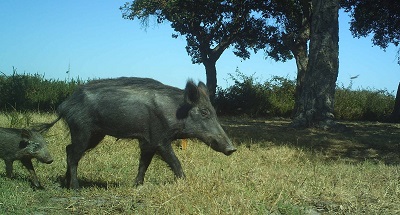The ICTS-EBD participated, together with several international and national scientific institutions, in a study led by Instituto de Recursos Cinegéticos (IREC) about the long-term deteterminants of the seroprevalence of Toxoplasma gondii in Doñana's wild ungulate community (see photo of wild boars in Doñana, by Paco Carro) (https://pubmed.ncbi.nlm.nih.gov/33317081/).
Toxoplasma gondii is a protozoan that infects warm-blooded vertebrates, including humans, worldwide. The research team studied the seroprevalence in the wild boar (Sus scrofa), red deer (Cervus elaphus), and fallow deer (Dama dama) during 13 years (2005–2018). The combination of environmental, population, and stochastic factors determined, over the mid- and long-term, the high seroprevalence of T. gondii in wild boar, red deer and fallow deer. The results indicated that seroprevalence was affected by factors operating at the community level (individual, population and species).
The complex interplay among hosts, the overlap of both ecological and epidemiological niches, and the occurence of optimal climatic conditions for the survival of oocysts in Doñana, may all favor the spread of the parasite across its host community. This approach is key to understanding the epidemiology and ecology to T. gondii infection in wild host communities in a context where the decline in seroprevalence leads to loss of immunity in humans.
Reference
Patricia Barroso, Ignacio García-Bocanegra, Pelayo Acevedo, Pablo Palencia, Francisco Carro, Saúl Jiménez-Ruiz, Sonia Almería, Jitender P Dubey, David Cano-Terriza, Joaquín Vicente. Long-Term Determinants of the Seroprevalence of Toxoplasma gondii in a Wild Ungulate Community. Animals 2020, 10(12), 2349; https://doi.org/10.3390/ani10122349
https://pubmed.ncbi.nlm.nih.gov/33317081/

 Las altas temperaturas están provocando que las lagunas y las marismas de Doñana pierdan agua rápidamente
Las altas temperaturas están provocando que las lagunas y las marismas de Doñana pierdan agua rápidamente




